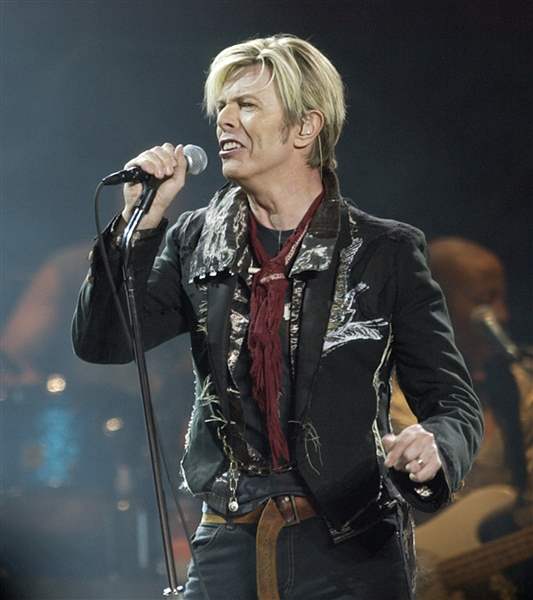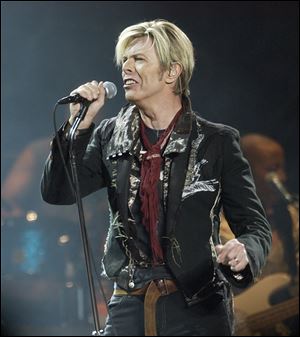
'Starman' considers David Bowie's iconic androgyny
7/22/2011
Singer/songwriter David Bowie performs at Madison Square Garden in this 2003 file photo.
KATHY WILLENS / AP

Singer/songwriter David Bowie performs at Madison Square Garden in this 2003 file photo.
A few years ago, critic Chuck Klosterman, writing about rock music, made an argument of the sort that can really disrupt a dinner party. Klosterman declared, "Given the choice between hearing a great band and seeing a cool band, I'll take the latter every single time." He didn't add, but he might have, "Discuss."
When he was in his late teens, David Bowie had little talent but cool to burn. His prettiness — think of Rob Lowe as an ethereal blond — was marred, provocatively, by his jagged and vampiric British teeth. A punch he'd taken as a schoolboy rendered one of his blue eyes permanently dilated, so it seemed to be a different color.
There was something alien and quickening about David Jones, as he was then still known, and people longed to gawk at him. He replaced more talented singers in bands because, well, that's what cool kids do.
''When John sang, the kids kept on dancing," a member of one of Bowie's early bands said about its soon-to-be-replaced singer. "When David sang a number, they stopped to look."
Girls looked; boys did, too. In his thoroughgoing new biography, "David Bowie: Starman," British rock journalist Paul Trynka considers at length the startling androgyny that made Bowie a defining human being of the 1970s.
About Bowie's flamboyant alter ego, Ziggy Stardust, and his band, the Spiders From Mars, Trynka writes, these guys were "dangerous, a warning to lock up not only your daughters but also your sons."
What cool giveth, cool can taketh away. By the time Bowie entered my consciousness in the early 1980s, when I was in high school, he'd gone mainstream, and I loathed him in a way that only an ardent young record buyer can loathe. His new hits — "Let's Dance," ''China Girl" — blurted from car radios like flatulence. He did a Pepsi commercial. Trynka quotes music writer Charles Shaar Murray, wonderfully, about Bowie's puzzling career choices during the '80s. "I suddenly thought, he's turned into a rock-and-roll version of Prince Charles," Murray said, noting the "old-fashioned haircut like a lemon meringue on his head."
I've since caught up, a bit, with Bowie's earlier and best music, and I looked forward to "David Bowie: Starman" to hit the reset button on my sense of the man and his work. On that level, this book works. It pursues a number of galvanizing themes. It argues for Bowie less as an instinctive rocker than as a shape-shifting cabaret singer and composer writ large, a performer working in the tradition of Harold Arlen, Frank Sinatra, Hoagy Carmichael and Bertolt Brecht as well as the blues. Bowie was an outsider. Before him, the author writes, "pop music had been mainly about belonging." His music meant so much to so many because it presented "a spectacle of not-belonging."
The book depicts Bowie as charming but calculating and ruthless — a man who made few close friends and cared mostly about tending to what the author calls "Brand Bowie." Morrissey, the singer, said about him: "He's a business, you know. He's not really a person."
Bowie was not a natural singer or songwriter and toiled for his success. He has a good ear, so good that some of his best material, the author argues, pickpocketed the work of others. Trynka notes how closely Bowie's song "Starman" resembles "Over the Rainbow." Bowie's hit "The Jean Genie" pilfered a riff from Muddy Waters' "I'm a Man." The song "Life on Mars" borrowed a chord sequence from a French song called "Comme d'Habitude," later reworked into English by Paul Anka as "My Way."
Trynka was the editor of Britain's classic-rock magazine Mojo from 1996 to 2003; his books include the biography "Iggy Pop: Open Up and Bleed." He interviewed more than 250 people to write "David Bowie: Starman," and although Bowie himself did not cooperate, this book feels close to definitive. He deftly knocks down stories like one told by Bowie's first wife, Angela, who claimed she caught him in bed with Mick Jagger. The idea that either of these rivals would submit to the other, the author reports, is "unthinkable."
"David Bowie: Starman" is a better-than-average rock biography, but just barely. It's patient and respectable without being quite likable, without ever quite becoming your friend. When you put this heavy thing down, it doesn't call out to be seized back up again quickly. You may begin to circle its bulk warily. The critic in Trynka too rarely emerges. Midway through, I began to realize that the Bowie book I longed to read would be similar to Greil Marcus' recent assessment of Van Morrison, the shrewdly essayistic "When That Rough God Goes Riding." I wanted a critic's case for Bowie, to be guided through his most transcendent work. One can't blame an author for not writing a book he didn't write, however. And many moments in "David Bowie: Starman" made me lean forward with pleasure. Trynka has a way with a phrase. Writing about an early sexual experience Bowie supposedly had with a boy named Mike, the author doesn't simply say the two of them made out. He writes, "Mike had investigated the contents of David's trousers."
About "The Laughing Gnome," a terrible early song of Bowie's, the author says, "As long as one is happy to abandon all notions of taste, the song is brilliantly crafted." Even better, he adds about this song, "In the admittedly narrow niche of pseudopsychedelic cockney music-hall children's songs, it reigns supreme." The author quotes others well, too, a quality I admire. A friend of Bowie's, talking about the absurd amount of sex that went on in the singer's home, reports, "I used to wake under a pile of bodies."
Bowie was born David Robert Jones on Jan. 8, 1947, in the postwar gloom and rubble of the Brixton district of south London. His family was middle class. His father had owned a theater troupe and invested in a nightclub before going to work for a children's charity. His mother, his father's second wife, had been a waitress. Bowie had two siblings, a half-brother named Terry and a half-sister named Annette. While contemporaries like Keith Richards were spellbound by rural U.S. bluesmen like Muddy Waters, Bowie's early hero was Little Richard, a rowdy boy of indefinite sexuality. The young David Jones played with, and discarded, several bands before deciding to go solo and change his last name to Bowie, after the Texas folk hero Jim Bowie, played by Richard Widmark in the film "The Alamo."
David Bowie, now 64 and married to the Somali-born model Iman, hasn't released a studio album since 2003 and in 2004 had emergency angioplasty for a blocked artery.
''For the fans," Trynka writes, "Bowie's continuing absence seemed an almost unforgivable desertion."
The epilogue of "David Bowie: Starman" contains this sanguine observation, however: "In 2012, his back catalog will be available for license once more, and many fans hope to see what is thought to be the most intriguing set of unreleased recordings of audio and video outtakes of any major recording artist."
David Bowie's greatness, this book suggests, more than caught up with his coolness.